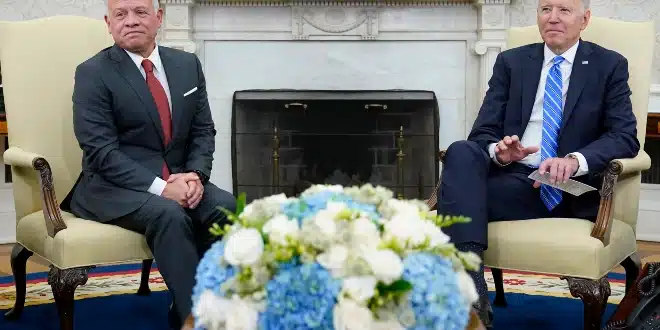President Joe Biden is set to welcome King Abdullah II of Jordan to Washington on Monday, where they are slated to address the pressing issue of securing the release of hostages in Gaza and express their concerns regarding potential Israeli military actions in Rafah.
This significant meeting marks the first interaction between the two leaders following the death of three American soldiers in a drone attack on a U.S. base in Jordan last month, an incident Biden attributes to Iran-supported militias. This attack represents the first U.S. casualties from such groups in the Middle East since the onset of the conflict between Israel and Hamas.
Amid efforts to negotiate a ceasefire to facilitate humanitarian aid delivery and secure the release of hostages from Gaza, Biden’s administration faces criticism from the Arab-American community for its ongoing support of Israel amidst the escalating toll in Gaza.
Negotiations for a ceasefire seemed to be advancing, with a senior U.S. official indicating that a potential agreement for the release of hostages in exchange for halting the conflict was nearing completion, despite remaining challenges.
Significantly, Biden’s recent discussion with Israeli Prime Minister Benjamin Netanyahu concentrated on the prospect of Israeli forces expanding into Rafah. Biden expressed strong opposition to such a move given the current circumstances, highlighting the humanitarian concerns with over 1.3 million people seeking refuge there. This stance represents Biden’s firmest position to date on the issue, following his critique of Israel’s actions in Gaza as “over the top.”
The U.S. has expressed skepticism about the feasibility of relocating civilians from Rafah to enable military operations, reflecting the complex humanitarian considerations involved.
Jordan, along with other Arab nations, has voiced strong criticism of Israel’s military engagements, calling for an immediate ceasefire to address the rising civilian casualties since the conflict’s escalation in mid-October.
Biden’s planned visit to Jordan, following the Hamas attack on October 7th, was canceled. However, he announced a temporary ceasefire and the opening of Rafah for aid delivery upon his departure from Israel, showcasing ongoing U.S. diplomatic efforts in the region.


